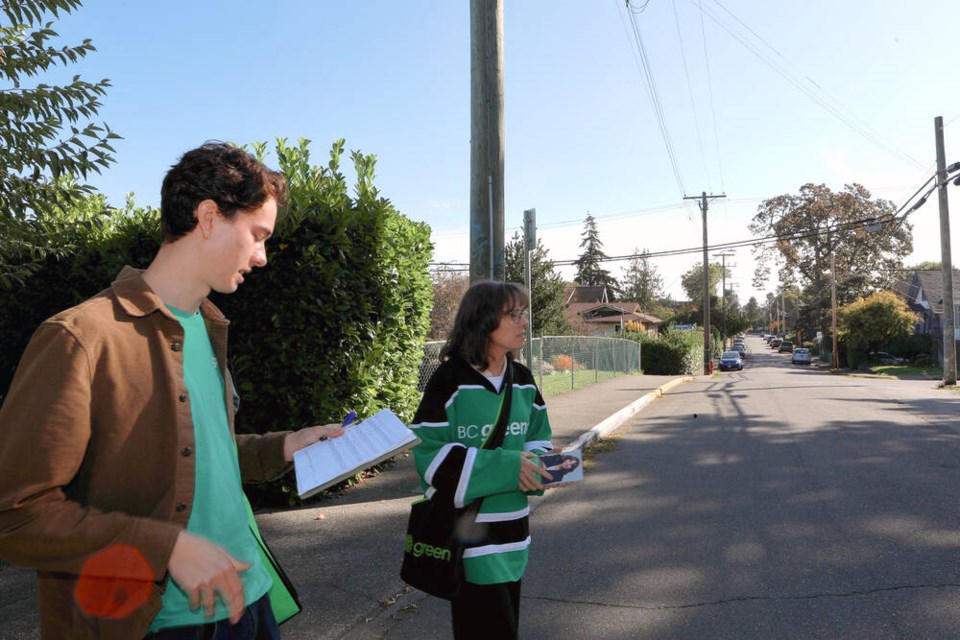There are a lot more wild cards than usual in the 2024 provincial election campaign.
Opposition Leader Kevin Falcon surrendered his two dozen caucus members without a shot three weeks ago, which rewrites the lineup. There are six independents running, five of them former BC United MLA incumbents with much better shots at winning than most lone wolves.
Then there’s the B.C. Green Party, which unseated a government seven years ago after winding up holding the balance of power.
The prospect of a minority government with a mix of independents and Green MLAs in the expanded 93-seat legislature gets Green Leader Sonia Furstenau positively giddy with anticipation.
Remember the weeks of dramatic scheming in 2017 when the B.C. Liberals led by Christy Clark won by two seats but found that with three Green MLAs it wasn’t enough?
It took three weeks of negotiations and then a non-confidence vote and a collapse of government before it was clear who won. Election Day was May 19 but John Horgan wasn’t sworn in as premier until July 18.
Furstenau’s fondest hope is that something similar could happen again.
She launched their campaign Saturday, saying voters have the opportunity to create the most representative legislature ever, with strong independents from around B.C. and a potentially pivotal Green caucus.
Majority governments “campaign on one thing, and they govern differently,” she said. “They promise a bunch of things and they fail to deliver.”
In a minority, people would see specific commitments and timelines, a la the confidence deal in 2017.
The Greens are trying for a full slate, but most of their emphasis will be on Vancouver Island and some coastal ridings.
“I think of it as a little green life raft around the Salish Sea,” said Furstenau.
The crucial focus will be on Victoria-Beacon Hill, where she moved after winning in the Cowichan Valley twice.
It’s held by Minister of Children and Family Development Grace Lore, successor to former NDP leader Carole James, and it’s been NDP for most of the last 50 years. Lawyer Tim Thielmann is running for the B.C. Conservatives.
With the only other Green MLA — Adam Olsen in Saanich North and the Islands — retiring, much of the Green Party’s fate hinges on Furstenau staying in the legislature.
She cited a number of issues where she stands apart from NDP Leader David Eby and Conservative Leader John Rustad. She’s the only leader duly elected by her members, for one. She’s also now the only one who supports a consumer carbon tax.
After repeatedly committing to maintaining it, Eby adopted Rustad’s stance last week and said if the national requirement for taxing emissions vanishes after the next federal election he’ll abandon it.
But based on the trio’s appearances at the Union of B.C. Municipalities convention in Vancouver this week, there’s another difference that could become important.
She’s a lot more optimistic and upbeat than the other two.
Eby had two main themes. He heaped contempt on Rustad and the Conservatives’ extreme views on various issues. Then he explained how hard his government is trying to deal with various wretched, pervasive crises, like housing and public safety.
Rustad said Eby and the NDP are lying about him and stressed what a hellscape downtowns have become under the NDP’s watch.
Furstenau, by contrast was a cheery ray of … sunshine/solar power.
“I want to offer something completely different from what’s being offered by the other two political parties right now, which seems to be a lot of fear and a lot of anger and a lot of finger pointing.
“We don’t have time.”
At her Saturday campaign launch, she spent most of her time on a Q and A with the audience and stressed that a minority outcome would be better than “winner take all.”
She told reporters: “We have two political parties right now that are focusing on everything that’s wrong, on everything that’s terrible, on all the ways that the other side is so bad. I think that’s exhausting for people. … An election should be about an inspiring vision for the future.”
Greens have a lower-budget campaign than the other contenders, but she has a spot in the televised leaders’ debate coming in a few weeks. If she maintains that approach, it might get people thinking.
It has a certain appeal.
>>> To comment on this article, write a letter to the editor: [email protected]




